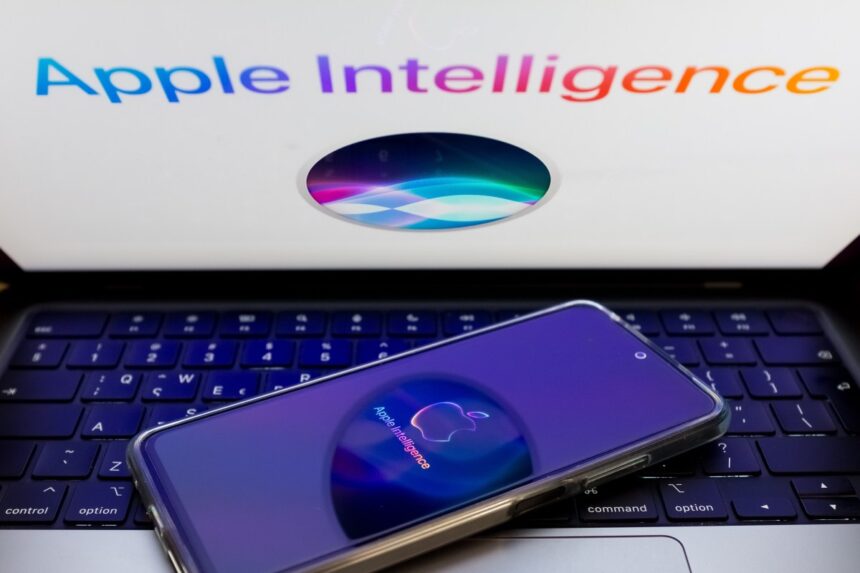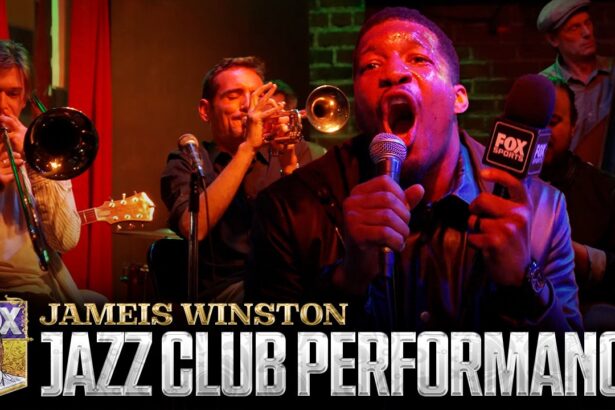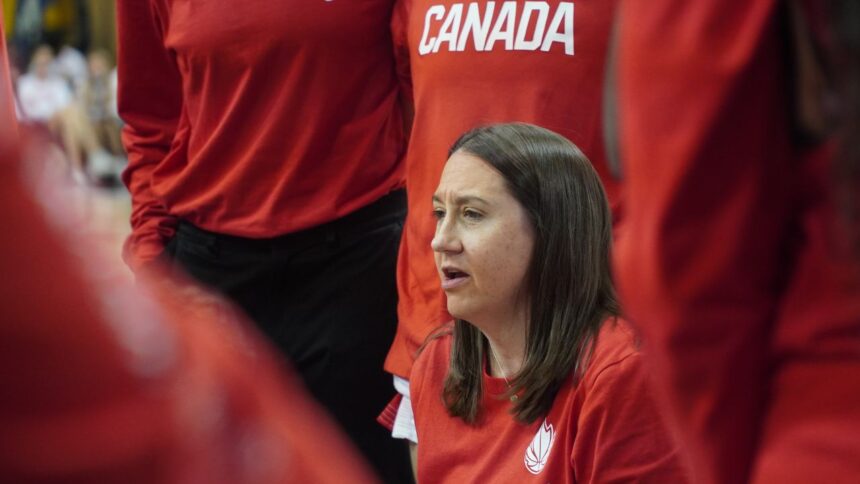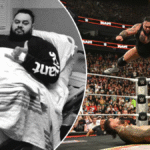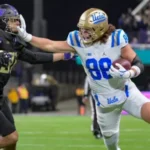TORONTO — Having coached at the U17, U19, Olympic and Canadian collegiate levels, there aren’t many challenges head coach Carly Clarke hasn’t faced. It only makes sense that she would be the coach tasked with guiding Canada’s women’s under-23 team at GLOBL JAM and prepping them for the challenges to come with the national team.
Clarke, the head coach for Toronto Metropolitan University — a program well-versed in success under her leadership, having led TMU to an undefeated season in 2021-22 — is taking back her spot on home court behind the bench at Mattamy Athletic Centre with the U23 side. She last coached the team in 2022, guiding a team fronted by the likes of Aaliyah Edwards and Shayeann Day-Wilson to a first-place finish.
Since then, Clarke coached Canada’s U19 side at the FIBA Women’s World Cup, helping them to a bronze medal, was an assistant with the senior women’s national team at the Paris Olympics and, most recently, helped Canada to bronze at the FIBA Women’s AmeriCup as an assistant under Georgia Tech head coach Nell Fortner.
With her work so intertwined as a developmental staffer alongside a promising generation of up-and-coming Canadian women’s hoopers, working GLOBL JAM is something she looks forward to. More than that though, it’s another chance to lead Canada, and for her, “there’s no greater honour than to wear this flag and represent ourselves, certainly on home soil.”
Sportsnet had the chance to sit down with Clarke before the tournament tips off on Wednesday to talk about her feeling of responsibility guiding the program, helping U23 players find their footing at GLOBL JAM, and why this may be one of the most promising crops of players to don the maple leaf for years to come.
Sportsnet: It’s been two years since the last GLOBL JAM and three years since you were behind Canada’s bench for this event. What do you see having changed about Canada’s program in that time?
Carly Clarke: I think a couple things stand out. Obviously, there was an Olympics between the last event, and I think we felt the hype around our national teams during the Olympics, both the men’s and women’s side. (We felt) the expectations of those teams at that level, and you know, I think that’s a product of the help from GLOBL JAM, to give experiences to our players, to grow, to develop.
There’s been multiple athletes, certainly from the women’s side, that have participated in Global Gym and gone on to play World Cups, have played at Olympic games and other major events with our senior team, so it’s a key development tool for us.
SN: You mentioned expectations. I think a lot of people are looking at this women’s national team and especially this generation, as having the potential to take the program to new heights. How are you managing those expectations and do you see this group in a similar way?
CC: Definitely. I first would say we do have some tremendous veteran players that have helped get the program to where it is now and, you know, so much work has gone into that, and I think that’s a really important piece because there’s a culture, there’s a passion for playing for Canada that our senior players have led the way and modelled and created a vision that all these young players want to do that.
With that, the more times that you’re present at all these world championship events, Olympic events, etc., you get there and that becomes expectation for more, which is fantastic. What the young players are bringing are, I think, some experience winning, you know, they’ve won in different contexts … they’ve demonstrated their ability to perform in big moments and I think that experience is really, really important. As they move into our senior group, we’re getting more depth, more experience at world events and in other high-level contexts that will just give confidence to win in the big moments.
SN: A lot of players on the U23 roster have suited up together for other levels of the national team, some even with the U19 side last month. How important do you think that consistency over different levels is to this group currently and to future groups potentially?
CC: I think it’s one of the most important things. At the world level, when you’re competing in the Olympics and the World Cup, every team has talent and what’s going to separate your teams when you get to those events is your chemistry, your connection, your ability to play together. So the more touch points we get with more of our athletes to train together, compete together, perform better, that’s going to set us up for success in those big moments.
SN: With the talent pool growing every year, how do you go about managing the challenge of picking out a roster with a group that seems to be growing that much more?
CC: I think that’s an exciting part for us, for me as a coach, and I’m sure for the federation overall, managing selection and whatnot. I think one of the things that now we’re talking about is the commitment that’s required and making sure that our athletes are continuing to demonstrate the commitment that we need to win, and then it becomes about sacrifice, and we’ve seen that a little bit on the men’s side.
When you have eight NBA players on your team, you can’t start them all, they can’t all play all the time. So, you know, are we willing to put the team first? To have that depth is something that’s so important, but also to buy into the role and do everything you can for the team.
SN: Your background coming from TMU but having also worked with U17, U19 and Olympic groups, how do you think that all these different levels have translated to an event like this, and how do you think it can help you work with players in this sort of setting?
CC: The national team environment is so different from a university season, in that you have a week or so to prep your team, and you’re right into competition. So I’ve had a ton of experience over the years at every level to figure out how to put a team together in a short period of time.
I think being able to link concepts between senior and the development age groups, and kind of link our systems, is an important piece that I’ve learned through the years, and just recognizing where the opportunities for development are. This is a group that’s on the cusp of (being on the senior team), and has some senior team members, but also groups that are coming from that development age, so (I’m working on) being able to mesh both sides of that, and continuing to find ways for all of us to get better.
SN: Having worked with these players before at different levels, has that kind of eased the burden and helped you prepare the side a little bit better?
CC: I think so. The more you have relationships with the athletes, the more you can help build them up and get them going together, so certainly I’m really fortunate to have had a lot of time with a lot of these players in different contexts, and I think there’s trust and respect in both directions that allow us to push to move forward.
SN: Between your time at TMU and with the Canada Basketball, why is it that you want to work with players in this stage of their development?
CC: For me, personally, I am passionate about representing Canada at every level. There’s no greater honour than to wear this flag and represent. Certainly on home soil, but anywhere in the world. … Also, for me, every time I get to coach, there’s a chance for me to learn and get better and develop, and, ultimately, I’m passionate about finding a way for our program to earn a spot on the podium at the Olympics. And we know that this age group, this development, every opportunity we get together is an opportunity to grow and prepare ourselves to be ready for those moments at the Olympics, so anything I can do to help our players’ program reach that goal, I’m proud to do it.
SN: You’re gonna be coaching on home soil. Not only are you in Canada, but the tourney is going to be at TMU. What’s having that home court advantage like, especially after having to suit up for these other international tournaments abroad?
CC: For TMU, from when I started there in 2012 to now in 2025, they’ve been the most supportive of me pursuing the national team opportunities, and they recognize the value in that for our university, for our student-athletes, for our program. So to be able to represent Canada in front of our TMU friends and family and etc., that’s really meaningful, and it’s just special to have both worlds colliding together on home soil.
SN: Why do you think it’s important to have this sort of tournament in Canada?
CC: I think this tournament creates familiar faces that the fans are going to know and begin to love if they don’t already, and then they’ll be able to follow their careers in other contexts, as well as with the national team moving forward. And then also, I think it exposes young kids and young players to aspire. You can’t be what you can’t see, so the chance for our young players to watch these players and go, ‘I want to be that someday’ and have that goal and motivation grow amongst them, I think that just hits all the different areas.


